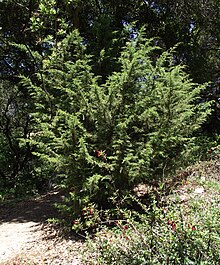Hesperocyparis goveniana
| Hesperocyparis goveniana | |
|---|---|

| |
| Hesperocyparis goveniana at the UC Botanical Garden, Berkeley, California | |
| Scientific classification | |
| Kingdom: | Plantae |
| Clade: | Tracheophytes |
| Clade: | Gymnospermae |
| Division: | Pinophyta |
| Class: | Pinopsida |
| Order: | Cupressales |
| Family: | Cupressaceae |
| Genus: | Hesperocyparis |
| Species: | H. goveniana |
| Binomial name | |
| Hesperocyparis goveniana ((Gordon) Bartel | |

| |
| Natural range of Hesperocyparis goveniana (sensu stricto) | |
| Synonyms[3] | |
List
| |
Hesperocyparis goveniana commonly known as Californian cypress[4] and Gowen cypress,[5] is a species of western cypress that is endemic to a small area of coastal California near Monterey. It was formerly classified as Cupressus goveniana.
Distribution
The tree is endemic to the Monterey Peninsula in coastal Monterey County, located on the Central Coast of California, in the Western United States.
The tree is found in small, scattered populations, and not in large forests of its species. Hesperocyparis goveniana occurs with Hesperocyparis macrocarpa (Monterey cypress), in the two groves where the Monterey cypress occurs naturally, in Monterey County.[6] Outside of California, Hesperocyparis goveniana has been introduced to Robinson Crusoe Island in Chile.[7]
It is on the IUCN Red List of endangered species.[1]
Description
Hesperocyparis goveniana is an evergreen tree with a conic to ovoid-conic crown, very variable in size, with mature trees of under 1 m (3 ft 3 in) on some sites, to 50 m (160 ft) tall in ideal conditions.[8]
The foliage grows in dense sprays, dark green to somewhat yellow-green in color. The leaves are scale-like, 2–5 mm (0.08–0.20 in) long, and produced on rounded (not flattened) shoots.
The seed cones are globose to oblong, 11–22 mm (0.43–0.87 in) long, with 6 to 10 scales, green at first, maturing brown or gray-brown about 20–24 months after pollination. The cones remain closed for many years, only opening after the parent tree is killed in a wildfire, thereby allowing the seeds to colonize the bare ground exposed by the fire. The male cones are 3–5 mm (0.12–0.20 in) long, and release pollen in February/March.
Typically cones of H. goveniana are smaller than those of H. macrocarpa.
Taxonomy
Hesperocyparis goveniana was first described and given the scientific name Cupressus goveniana by George Gordon in 1849.[3] It was described from a specimen grown in the gardens of the Royal Horticultural Society from seed collected by Karl Theodor Hartweg. It was named by Gordon for the then secretary of the society, James Robert Gowen.[9] In 2009 genetic research into the relationships of Cupressus and Juniperus lead to the reclassification of almost all the new world species into a new genus, Hesperocyparis by Jim A. Bartel.[3] This move has been disputed,[10] but as of 2024 Plants of the World Online (POWO),[3] World Flora Online (WFO),[11] and the USDA Natural Resources Conservation Service PLANTS database (PLANTS) all list Hesperocyparis goveniana as the correct name.[12]
The varieties or subspecies, formerly included under Cupressus goveniana include:
- Cupressus goveniana var. goveniana — reclassified as Hesperocyparis goveniana.
- Monterey County, strictly coastal, within 3 km (1.9 mi) of the coast and below 200 m (660 ft) altitude. Foliage dark green, not rough, with leaf tips not spreading; cones globose.
- Cupressus goveniana var. pigmaea, reclassified as Hesperocyparis pygmaea — Mendocino cypress (vulnerable species).[13]
- Mendocino and Sonoma counties, coastal, within 10 km (6.2 mi) of the coast and below 500 m (1,600 ft) altitude.[14]
- Cupressus goveniana var. abramsiana, reclassified as Hesperocyparis abramsiana — Santa Cruz cypress (endangered species).[15]
- Santa Cruz and San Mateo counties, in the Santa Cruz Mountains 10–20 km (6.2–12.4 mi) inland and at 300–760 m (980–2,490 ft) altitude. With yellow–green foliage slightly rough-textured from the acute and slightly spreading leaf tips; cones often oval.[16]
References
- ^ a b Farjon, A. (2013). "Cupressus goveniana". IUCN Red List of Threatened Species. 2013: e.T42219A2962566. doi:10.2305/IUCN.UK.2013-1.RLTS.T42219A2962566.en. Retrieved 13 November 2021.
- ^ NatureServe (2024). "Cupressus goveniana". Arlington, Virginia. Retrieved 8 February 2024.
- ^ a b c d "Hesperocyparis goveniana (Gordon) Bartel". Plants of the World Online. Royal Botanic Gardens, Kew. Retrieved 8 February 2024.
- ^ BSBI List 2007 (xls). Botanical Society of Britain and Ireland. Archived from the original (xls) on 2015-06-26. Retrieved 2014-10-17.
- ^ "Cupressus goveniana Gordon – (not an active name) – Gowen cypress". CalFlora. Retrieved 2023-01-04.
- ^ Hogan, C. Michael; Frankis, Michael P. "Monterey Cypress (Cupressus macrocarpa)". iGoTerra.com. Retrieved 25 December 2018.
- ^ Greimler, Josef; Lopez, Patricio; Stuessy, Tod F.; Dirnbiick, Thomas (July 2002). "The Vegetation of Robinson Crusoe Island (Isla Masatierra), Juan Fernandez Archipelago, Chile". Pacific Science. 56 (3). University of Hawai'i Press: 263–284 [277]. doi:10.1353/psc.2002.0022 – via Scholarspace.
- ^ "Hesperocyparis goveniana (Gordon) Bartel". Jepson eFlora: Taxon page. University of California, Berkeley. Retrieved 2023-01-04.
- ^ Gordon, George (1849). "New Plants, Etc., From the Society's Garden". The Journal of the Horticultural Society of London. IV. London: 295–296. Retrieved 8 February 2024.
- ^ Mаеrki, Didier (31 January 2017). "Editorial: Recent developments in the taxonomy of the genus Cupressus and consequences for their conservation" (PDF). Bulletin of the Cupressus Conservation Project. 6 (1): 3–24. Retrieved 7 February 2024.
- ^ "Hesperocyparis goveniana (Gordon) Bartel". World Flora Online. Retrieved 8 February 2024.
- ^ NRCS (8 February 2024), "Hesperocyparis goveniana", PLANTS Database, United States Department of Agriculture (USDA)
- ^ Calflora Database: Hesperocyparis pygmaea
- ^ Gymnosperm Database: C. goveniana var. pygmaea (Hesperocyparis pygmaea)
- ^ CalFlora Database: Hesperocyparis abramsiana
- ^ Gymnosperm Database: C. goveniana var. abramsiana (Hesperocyparis abramsiana)


